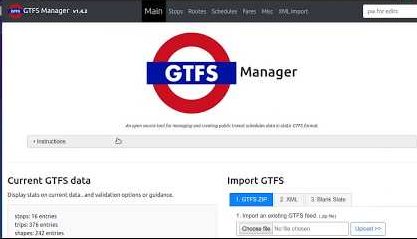static  Manager
Manager
An open source tool for managing and creating public transit schedules data in static GTFS format.
Instructions

Click here to see a demo video.
- This is the home/main page of the tool. It gives you and overview of your data, and here you can import/export your GTFS feeds.
- There are 4 sections on this page:
- Current GTFS data : current stats of data in database.
- Import GTFS : Import a GTFS feed to load it into the database and edit it with this tool. You can also load in other formats or start a Blank Slate (blank GTFS feed).
- Browse past GTFS Exports : See past exports and backups of the database. To revert to an older version of the data, download a past feed and re-import it using the Import GTFS section.
- Commit and Export GTFS : Feeling ready with the data? Or just want to keep a backup? Type in a name for easy identification, and press the big green button!
- Please make sure you are well versed with the static GTFS standard before using this tool.
Current GTFS data
Display stats on current data.
Loading stats..
Import GTFS
1. Import an existing GTFS feed. (.zip file)
2. Import data in other formats
- If your data is in Kochi Metro's XML format, click here.
- If your data is in Hyderabad Metro's CSV format, click here.
3. to start making a GTFS feed from scratch.
Note: All of the above 3 actions will wipe out the current data in the db. A backup GTFS export will be made just in case you want to revert later. You can find it from the past commits section after refreshing this page.
Export GTFS Feed
If you feel like your data is ready, choose a commit name and press the button to create a freshly minted GTFS feed!
Log
Browse past GTFS Exports
Listing past commits with links to download GTFS feed zip.
(latest first, oldest last)
Loading past commits..